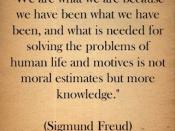Freud and Religion
From the beginning of human kind's existence in this universe, religion has always been an important concept of life for every civilization. In his book "Future of an Illusion", Sigmund Freud critiques religion psychoanalytically and comes to a conclusion where he thinks religion is an illusion. As an atheist, he mainly argues that mankind will be better off when they stop their meaningless belief in religions. This paper is going to discuss and critique some of Freud's ideas about religion regarding to civilization, human psychology and science.
First argument Freud is making to critique religion in his book is that, mankind created civilizations to defend their selves against the unpredictable and destructive forces of nature. This argument of his is not relevant, because it is easy to understand from his book that Freud has little knowledge about historical facts. It is hard to understand how a scientist who searches proof and reason for every subject can be this much sure about this fact even when he doesn't know much about historical facts.
Freud also uses civilization concept as a step to argue the creation of religion by mankind. He makes a parallelism between the reasons why civilizations and religions were created. According to him, religions and divine powers were created because they protect the humanity against the forces of nature. Freud is trying to convince the reader that this argument is true for all religions, because he uses religion as a general subject. It is impossible to agree with this kind of a hypothesis, because it is a fact that, especially the monotheistic religions were created because of the bad morality condition of people, but not because of their fear of nature.
Freud's ideas about fear of nature creating religion can be accepted for the...



Not great
The author atacks Freud's views because the author believes that religion grew from a need for morality, not fear of nature. However Freud makes clear in the book that once civilisation learnt more about nature the role of religion changed to justify the laws of society, which no longer seemed relevent. As such religion changed to monotheism, with emphasis on the father God figure, to restate the moral laws.
3 out of 3 people found this comment useful.